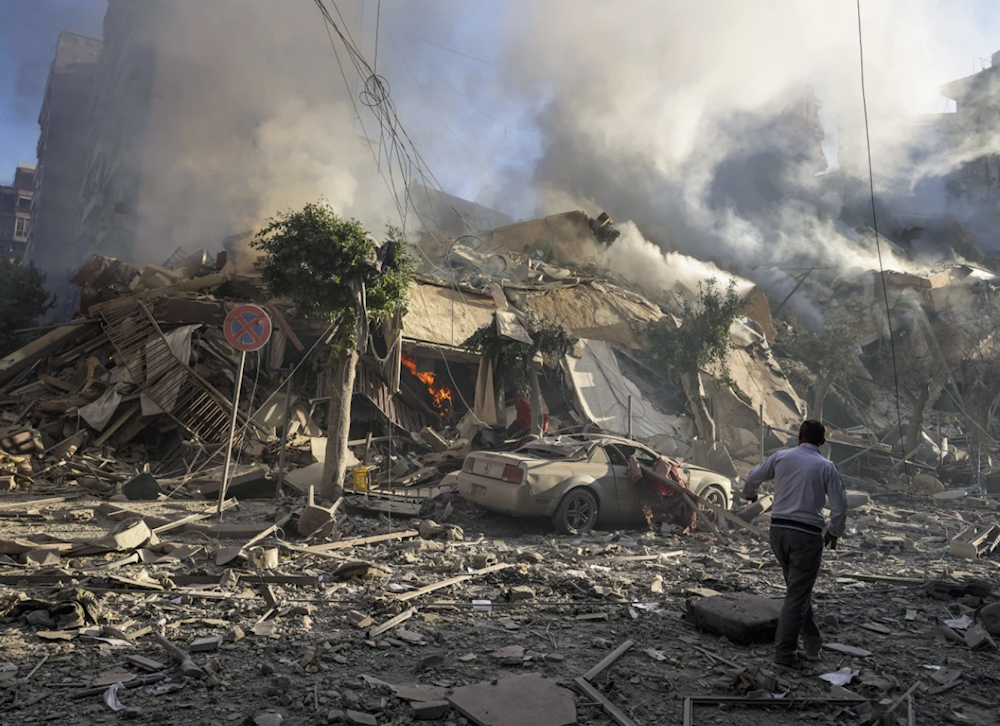IOF bombing, ground attacks creating 'humanitarian catastrophe': Oxfam
Oxfam's Lebanon Director says Israeli airstrikes in Lebanon are causing an unprecedented refugee crisis.
-

Smoke rises from the site of an Israeli airstrike in Dahyeh, Beirut, Lebanon, Thursday, Oct. 3, 2024. (AP)
Oxfam has asked the international community to denounce Israeli aggression on Lebanon and make decisive efforts to end the war, as unrelenting Israeli bombing and ground attacks cause another "humanitarian catastrophe", according to Anadolu Agency.
"Israel" has killed 1,974 people and wounded 9,384 others since the beginning of the Israeli aggression on the country on October 8, 2023, and its expansion about a week ago.
"Israel continues to act with impunity, and it must be held to account for its actions in both Lebanon and Gaza," the organization stated in a press release. According to Oxfam, “All parties must abide by international humanitarian law and be held to account where potential violations may be involved."
Tel Aviv's airstrikes on Lebanon are causing an unprecedented refugee crisis, and the scope of destruction and severity of attacks "is unlike anything I've ever seen," Oxfam's Lebanon Director, Bachir Ayoub, told Anadolu.
Urging a ceasefire and immediate protection of civilians, Ayoub stated that the Israeli aggression on Lebanon "was predictable and avoidable," stemming from the failure to establish a ceasefire in Gaza. He claimed that Lebanon has been plagued by crises for decades and has never truly recovered.
"This latest emergency will only deepen the existing challenges facing the people of Lebanon and further destabilize an already volatile region," Ayoub said.
Lebanon cannot bear the weight of war
According to Oxfam, “Lebanon and the region cannot afford to bear the weight of this crisis. This regional broader escalation underscores the urgent need for an immediate and permanent ceasefire in Gaza."
Ayoub also underlined the mounting toll of disaster and displacement in Lebanon, which is worsening by the day, emphasizing that Oxfam's priority is on the growing number of internally displaced individuals from severely affected areas.
As the humanitarian situation worsens on a daily basis, Ayoub raised concern about how agencies such as Oxfam will continue to assist the most vulnerable populations, expressing it was "very hard" to predict where things are headed.
A large number of displaced individuals have moved to northern Lebanon, which is the furthest from the southern border.
"So, for us, what we're seeing is half of the countries impacted by direct hostilities, and the other half is in support of those that have been displaced," he stated.
Oxfam warned that the inflow of displaced individuals from southern Lebanon will swiftly overwhelm local communities and outstrip the international humanitarian system's ability to respond effectively. The UN refugee agency, UNHCR, stated that about 100,000 Lebanese people have already gone to neighboring Syria.
Ayoub urged the international community to seek a diplomatic solution to cease the bloodshed against civilians, cautioning that many groups would struggle to maintain their operations without a considerable boost in financing.
He also expressed concern that the present humanitarian issue is receiving insufficient attention, adding that the emphasis should be on human impact and that "politics will eventually figure itself out the way it always does."

 3 Min Read
3 Min Read








